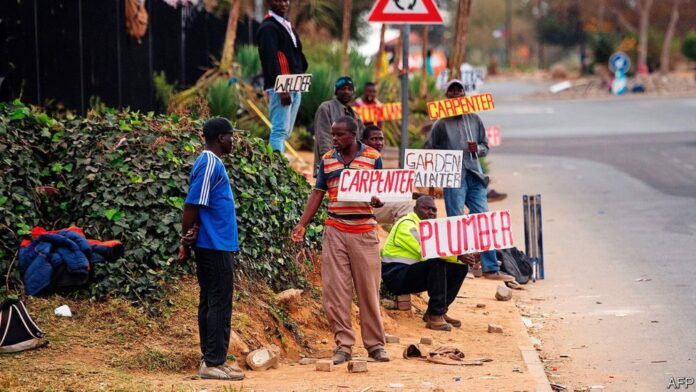The North West has overtaken the Eastern Cape to record the highest unemployment rate in South Africa, with 40.4% of people jobless between January and March 2025.
This was revealed by Rustenburg mayor Sheila Huma during her 2025/26 budget speech on Thursday, where she painted a stark picture of economic hardship across the city.
“Poverty is a prevalent issue in specific areas where our people reside, causing a sense of hopelessness and scarcity in communities that are already struggling with limited prospects and resources,” said Huma.
She stated that Statistics South Africa largely links the shift in rankings to the struggles of the mining industry.
Many people flock to mining towns in search of work, only to remain unemployed, discouraged, and stuck in areas that offer few alternatives.
Poverty, inequality and unemployment
Youth unemployment in the North West stands at a staggering 58.8%, with only 43% of young people participating in the labour market.
Huma described Rustenburg’s crisis as a triple challenge, which she says is a combination of poverty, inequality and unemployment that continues to trap residents in a cycle of struggle.
The issue of poverty, she said, is particularly severe in areas already lacking resources and hope. Unemployment hits hardest among Black women, who remain largely excluded from economic opportunities.
The spread of informal settlements across the city reflects more profound issues around inequality and poor spatial planning.
Many of these communities, including GG Tlhabane, Maumong village, and Rathibedi in Luka, continue to face basic service backlogs.
“The proliferation of informal settlements in our city serves as a daily reminder of the city’s incomplete pursuit of inclusivity, fairness, and spatial justice.
“It is here in this budget that we must change that narrative. Our people cannot be permanently relegated to being beggars in their own land,” said Huma.
Huma said these areas deserve high-quality services just like the rest of the city.
Vandalism of electrical equipment
Electricity supply is another serious concern. Residents living along the R510 and other parts of the city face frequent outages due to outdated infrastructure and illegal connections.
Vandalism and theft of electrical equipment have made things worse, and the cost of fixing the power system is estimated at R967-million. Just one key project, upgrading the industry’s substation, will require R85-million.
Water infrastructure is in no better shape. The current system is old and overburdened, swallowing a large portion of the city’s maintenance budget. Upgrades to the water system are projected to cost R1.6-billion.
Despite all these difficulties, Huma emphasised the strength and resilience of Rustenburg’s residents.
She said the people have shown unity and determination in the face of adversity and that no one should be left behind in the city’s development plans.
Non-payment of services
Financial strain also weighs heavily on the municipality, driven in part by widespread non-payment for services and national economic pressures.
In response, the city has launched programmes such as the revenue enhancement and My Citi My Responsibility to improve its financial health and ensure the continued delivery of services.
Huma said there have been signs of progress as some informal settlements, such as Popo Molefe and Mbeki Sun, have seen improved access to electricity and water.
Infrastructure development is continuing in areas like Boitekong and Ramochana, and the city’s public transport system is being enhanced to support mobility and urban resilience.
“Though certain objectives may have faced setbacks along the way, our firm commitment to infrastructure development persists,” said Huma.



